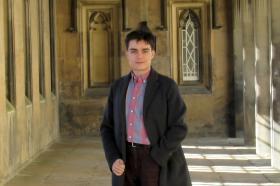LMH Undergraduate Presents AI Research at ISBI 2025
LMH Engineering undergraduate Samuel Simons presented an academic paper at the recent International Symposium on Biomedical Imaging (ISBI).
LMH Engineering undergraduate Samuel Simons presented an academic paper at the recent International Symposium on Biomedical Imaging (ISBI).

The conference, a leading global forum on the mathematical, algorithmic, and computational aspects of biomedical imaging, took place in Houston from 14th - 17th April.
Samuel’s paper, SpineFM: Leveraging Foundation Models for Automatic Spine X-Ray Segmentation, presents an innovative Artificial Intelligence (AI) system, SpineFM, designed to automatically detect and segment vertebrae in spine X-rays. This technology is a crucial step toward enhancing medical diagnostics, facilitating further analysis such as measuring vertebral compression or identifying early signs of spinal diseases including arthritis.
Explaining the approach behind his work, Samuel notes: “The system was designed to leverage the regular geometry of the spine, employing a novel inductive process to sequentially infer the location of each vertebra along the spinal column. Vertebrae are segmented using Medical-SAM-Adaptor, a powerful foundation model that first learns from millions of natural images, developing a broad visual understanding, before being fine-tuned on hundreds of X-rays to achieve expert-level precision in spinal segmentation.”
Samuel's project was developed as part of the University of Oxford’s Big Data Institute (BDI) Summer Internship Programme, under the supervision of Dr Bartek Papiez, LMH Stipendiary Lecturer in Information Engineering and Group Lead at the Big Data Institute. Over the course of the 12-week internship, the results of their research surpassed existing state-of-the-art methodologies, prompting Samuel and Dr Papiez to share their findings with the wider scientific community. Reflecting on this decision, Samuel explains: “After our method surpassed the previous state-of-the-art results, we decided that it was worth sharing our results with the scientific community. The International Symposium on Biomedical Imaging was our first choice due to its reputation as one of the top venues for high-impact research in the field.”
In Houston, Samuel presented his research in the form of a poster. This was a rare opportunity for an undergraduate student, and one that Samuel aims to take full advantage of.
He says: “While working on the project, it was easy to forget that there is a broader community of researchers tackling similar challenges; however, since making the project public, it has been very fulfilling to already hear from several people interested in my work. At the conference, I was very excited to share my project further and meet more people who are interested. As an undergraduate considering a future career in academia, having the opportunity to engage with experts and peers in the field is a rare and invaluable experience. It allowed me to gain insights into the latest advancements and develop my communication skills, which are essential for my academic growth. I am deeply grateful to Lady Margaret Hall and the Big Data Institute for their generous support, without which attending the conference would not have been possible.”